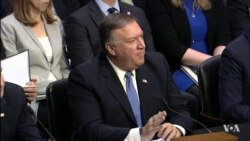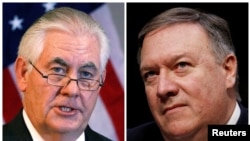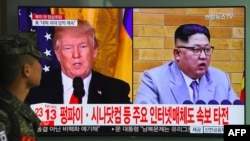Long-rumored to be in the works, U.S. President Donald Trump finally fired Secretary of State Rex Tillerson Tuesday, naming Central Intelligence Agency Director Mike Pompeo to take his place.
Speaking outside the White House, Trump explained the move by pointing to disagreements with Tillerson, while saying he and Pompeo, “We’re always on the same wavelength.”
“I’ve worked with Mike Pompeo now for quite some time,” the president told reporters. “Tremendous energy. Tremendous intellect.”
“The relationship has been very good and that’s what I need as secretary of state,” Trump said.
From the start of his tenure at CIA, Pompeo earned a reputation as a strong ally of the president, known for his tough views on terrorism, torture and Iran.
The 53-year-old former three-term congressman from the Midwestern state of Kansas has also forged a closer relationship with Trump, giving him the agency's daily intelligence briefings in person at the White House, rather than delegating that responsibility to a staff aide.
“He has the grounding for him to be able to grasp this information the way he can ask sophisticated questions that then lead to important policy discussions,” Pompeo said of his briefings to the president during an appearance in Washington in January.
Still, the move from leading the U.S. spy agency to leading the U.S. diplomatic corps is unusual.
“No other official has made that particular transition before, although a couple of former CIA directors have become secretary of defense,” Paul Pillar, a former senior CIA officer now with Georgetown University, told VOA. “William Casey wanted to be secretary of state, but [then President Ronald] Reagan did not give him that job.”
Pompeo and Russia
And while Pompeo initially won praise from the intelligence community – backing conclusions by U.S. intelligence agencies about the anti-secrecy group WikiLeaks and its connections to Moscow – he has also alienated some of those under his command.
Pompeo specifically garnered criticism for, at times, expressing views that seemed more in line with those of the White House while contradicting the CIA’s own findings.
“The Russian meddling that took place did not affect the outcome of the election,” Pompeo told an audience in Washington last October, even though an unclassified report by the top U.S. intelligence agencies issued in January 2017 made no such claim.
“We did not make an assessment of the impact that Russian activities had on the outcome of the 2016 election,” the report said.
Later, the CIA sought to clarify Pompeo’s comments.
“The intelligence assessment with regard to Russian election meddling has not changed, and the director did not intend to suggest that it had,” a CIA spokesman said.
At other times, Pompeo has publicly refused to rule out working with Russia in areas such as counterterrorism.
"If Russia has information that can help us fight the CT [counterterror] fight around the world, it's my duty to work with them and "the right thing to do," he said.
Pompeo also was criticized following a report by The Intercept that at the request of the president, he met with a former intelligence official who has been arguing U.S. intelligence officials are unfairly blaming Russia for the leak of Democratic National Committee emails.
“Pompeo has been far more of a policy advocate, and a political defender of the president, than is appropriate for an intelligence chief,” said Georgetown University’s Pillar. “Whether this move is good or bad for the Department of State or for U.S. diplomacy, it is better that Pompeo be in a policy-making job rather than the CIA job.”
Some of those tendencies appeared to be evident this past Sunday, when Pompeo appeared on several political shows to discuss proposed talks with North Korean leader Kim Jong Un.
"President Trump isn’t doing this for theater. He’s going to solve a problem," Pompeo told Fox News Sunday.
"Kim Jong Un now has committed to stopping nuclear testing, stopping missile tests, allowing exercises to go forward, something that has been incredibly contentious in the past," he said, calling Pyongyang’s commitments “real achievements."
"These are conditions that the North Korean regime has never submitted to in exchange for conversations," Pompeo said.
Before his confirmation as CIA director, some critics also voiced concerns about his stance on the use of torture.
Those involved in the CIA interrogation program "are not torturers, they are patriots," Pompeo said in 2014, adding that the programs were "within the law, within the Constitution and conducted with the full knowledge" of appropriate lawmakers.
During his confirmation hearing, Pompeo told senators he would “absolutely not” bring back such interrogation techniques.
Pompeo, a graduate of Harvard Law School, also drew criticism in 2013 after he suggested Muslim leaders who didn't publicly condemn terror attacks were "potentially complicit" in the attacks.







